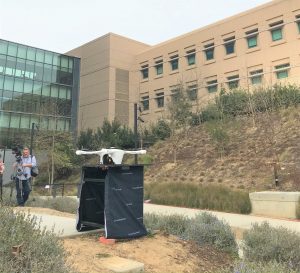Blood samples delivered by drone? Medical specimens via drones may soon become a reality thanks to a new partnership between UPS Flight Forward and Matternet, in conjunction with UC San Diego Health.

Medical specimens take flight
Last week, the first medical specimens were delivered by drone as part of a larger effort to integrate drones into San Diego’s airspace as part of the Integration Pilot Program. UC San Diego Health will be utilizing UAS as a means to deliver medical specimens and supplies to expedite health care services. It has become common practice for labs to operate separately from a hospital. This new partnership may mean faster diagnosis, treatment, or even peace of mind.
“Right now, most biological samples must travel between sites by courier car, within designated hours,” said James Killeen, MD, clinical professor of emergency medicine and director of information technology services at UC San Diego School of Medicine in UC San Diego’s announcement. “That leaves the system vulnerable to the vagaries of road congestion, accidents, construction, and more. Travel time can be slow and unpredictable. A drone can fly over such obstacles in a much more direct way, and take just a few minutes to cover the same distance.”
If successful, drones may even be used for organ transport in the future.
Why San Diego is creating a drone hub
According to the FAA Aerospace Forecast and Drone Analytics, the global drone industry is projected to be worth $43 billion by 2024. As a region, San Diego has made a name for itself by capitalizing on nascent technologies that turn into major economic engines – think genomics and ICT/satellite technology.
That’s why in 2017, EDC – in collaboration with the City of San Diego – spearheaded San Diego’s application to serve as a site for the Federal Aviation Administration’s (FAA) Unmanned Aerial System (UAS) Integration Pilot Program (IPP). San Diego as one of 10 jurisdictions that received the designation and the densest urban environment selected.
Today, EDC serves a much larger role as the program manager through an agreement with the City of San Diego. In addition to streamlining the process and clearing regulatory hurdles for operators (think companies like Matternet), the IPP also looks to position San Diego as a UAS center of excellence by encouraging the growth of the industry and building homegrown talent.
To achieve these goals, the IPP has four focus areas (International Relations, Environmental Survey, Public Safety, and Package Delivery), and boasts over 20 private, non-profit, government partners.
How the IPP launched SD’s first medical specimen flight
On February 25, the FAA officially approved the UC San Diego Health flight route that enabled Matternet, as the UAS operator, to carry out this mission until April 2023. UC San Diego is the second hospital system in the nation to transport medical specimens via drones.
Related EDC articles and research: